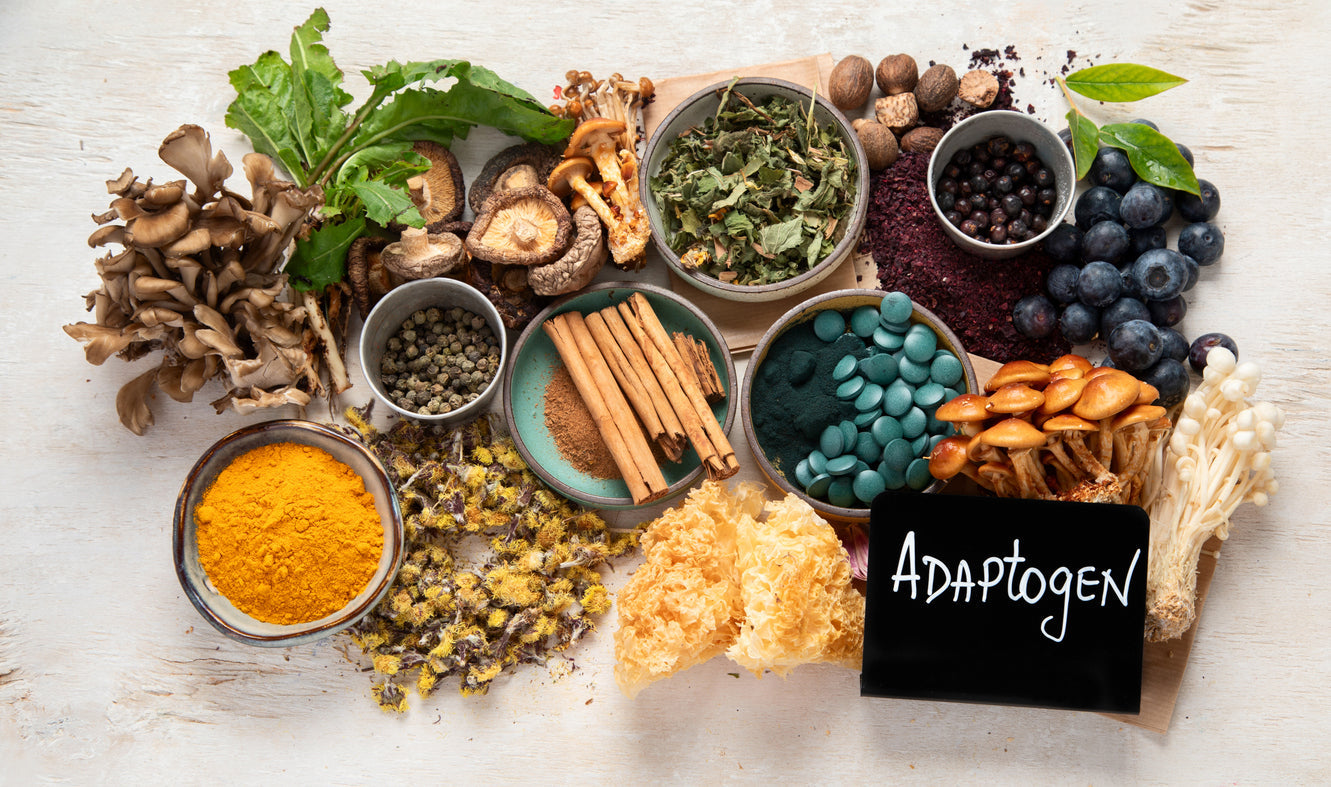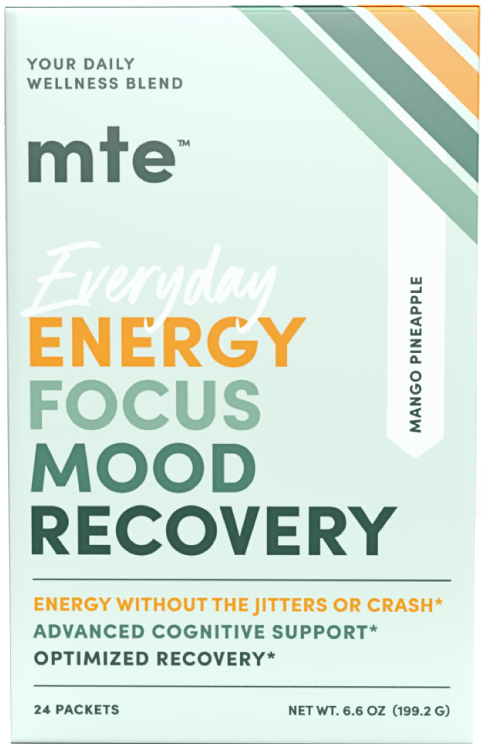
How to Biohack Stress & Mood with Targeted Adaptogen Stacks
We hear the term “biohacking” often nowadays, but it’s still a mystery as to what anyone means. Do you have to be a crazy billionaire and make your whole life into an unhinged experiment to biohack? Do you need an exact combination of 19 supplements that’ll somehow unlock secret superpowers? Is biohacking even real or is it another health-industry stupidity, like that time we thought radium was a healthy way to boost energy without caffeine?
Yes and no. The term “biohack” is really just trendy slang for working on yourself. The idea is to make small, targeted changes in your life that will result in biological changes, optimizing your health in the process. It’s a spectrum. You don’t need to sit in an ice bath for 30 minutes a day to call yourself a biohacker; switching your caffeine for adaptogens and nootropics counts just as much.
Stress and mood are two of the biggest culprits that steal our sleep, our joy, our health. And where society says pharmaceuticals and major life changes are the only way to relieve stress and improve mood, nature says something different. Certain classes of plants and other naturally-sourced compounds, referred to as adaptogens and nootropics, are bioactive, meaning they directly affect internal systems when consumed. The right combination, and a little consistency, can turn you into a major biohacker with minimal effort.
Let’s work smart, not hard.
Adaptogens: Nature’s Solution to Chronic Stress
Consider someone under high stress, or a person who deals with challenges related to overstimulation:
No matter what you do, you cannot calm down. Every day there’s this dread under everything. Some of the time, you don’t even know what you’re stressed about, which makes it worse. So your doctor prescribes you a medication for stress and reactivity, offering an easy path to relief. But the relief is temporary. The causes haven’t been addressed, so the problem is always there, lurking. Do we have the money to quit our jobs and Eat, Pray, Love? No. Do we have the time to spend 4 hours a day calming down with our favorite comfort show? Also no.
Adaptogens are a rare class of plants that contain compounds which interact directly with our native biology. Primarily, adaptogens promote stress resilience by modulating pro-stress chemicals, managing the brain’s control center for stress response—the HPA axis—and promoting the activity of pro-motivation chemicals. The byproduct is less energy spent managing stress, allowing your body to rebalance its natural energy production, storage, and use processes. So by helping you keep calm, adaptogens also tend to perk you up as well—in a not-panicked way.
Ashwagandha: The GOAT Adaptogen
One of our (and everyone’s) favorite adaptogens is ashwagandha. If there were a jack of all trades that were also a master of all, ashwagandha is the plant version of that. People have used this superpower adaptogenic herb for 6+ millennia; it’s an MVP in Ayurveda, TCM, and a host of other traditional medicines around the world. And now the health and wellness industry has fallen in love with it, too.
Ashwagandha (Withania somnifera) is thought to increase stress resilience, energy, and immunity by enhancing the activity of calming neurochemicals and suppressing pro-stress hormones like cortisol. It’s also posited that it boosts cognition via production of BDNF, reduces inflammation by reducing cytokine production, and increases production of immunocompetent cells. Does it, though? The science indicates a daily wellness drink with ashwagandha may:
- Improve physical performance (more speed, strength, VO2 Max)
- Promote restful sleep (better sleep quality, ease of waking)
- Reduce stress (better daily energy levels, quality of life)
- Boost cognition (better reaction time, attention)
- Improve mood (less reactivity, better coping)
- Increase brain health (improved task performance, executive function)
Nootropics: A Healthy Way to Lift Low Mood
Consider someone going through a really rough time or a person who struggles with chronic fatigue or persistent low mood:
No matter what you do, simply feeling okay seems like a pipe dream. Waking up every morning comes with exactly no joy; you’re walking through life working so hard to just exist. So you start a mood booster or stimulant regiment, and it takes the edge off—sometimes, for a little bit. But it also makes you jittery and kind of a jerk, according to your very patient spouse. But things don’t get better in any real way because you haven’t removed or even supported the things that ail you; you just covered them up for a minute.
Nootropics are a class of bioactive compounds, most of them naturally sourced, that are known as cognitive enhancers. Synthetic nootropics are often used in mainstream medicine for mental health conditions and mild cognitive dysfunctions. Caffeine is a nootropic—not one of the best nootropics for mood, though; stimulants don’t often stimulate much joy. Nootropics are thought to boost brain health and mental function by acting as a neuroprotective, increasing cerebral blood flow, promoting motivation and focus signaling, and reducing inflammation.
Saffron: Herbal Mood Booster
Saffron is another ancient crop that has stood the test of time, language, culture, and medicine. Also cuisine; there’s nothing quite like the aroma of saffron in biryani. The crocetin and safranal in saffron are where its mood-enhancing powers come from, and all the other cool things it has the potential to do, too. In studies, researchers have observed saffron supplements:
- Reduce the effects and damage of mild neurodegeneration
- Reduce the progression of Alzheimer’s
- Improve mood significantly compared to placebo
- Improve symptoms of MDD and chronic low mood comparatively to a common prescription
- Reduce the toxic effects chronic stress has on the brain
- Increase levels and activity of neurochemicals involved in mood, memory, and motivation
Consider feeling calm, capable, well-rested, and in control. Naturally, your immune system will repair itself; your gut will heal; your ability to recover from hard days or intense workouts will improve. Biohacking is all about targeted choices and a commitment to consistency, not extreme, arguably deranged measures like living at the bottom of the sea for 100 days just to see what happens. Nootropic mood enhancement and adaptogenic stress relief can come with a single, 2-minute daily wellness supplement.
The Science of Synergy: With Wellness, Less is More
The goal of health supplements shouldn’t be splitting and splicing to sell more and do less. It should be the opposite! How efficiently can we offer full-spectrum support for wellness, performance, and vitality? Make it a competition; make it an obsession. That’s what we did, and we ended up with this crazy little energy drink supplement that packs huge benefits into a small packet of greens powder. Adaptogens like maca promote resilience and recovery while nootropics like eleuthero support mood and cognition. Paraxanthine underlies it all with even, jitter-free energy, focus, and productivity.
The result is MTE: a daily wellness drink that’s part biohack, part lifehack. A mood and energy supplement without caffeine. A stress-relief drink that promotes mental focus. A nootropic drink for sleep that supports active recovery. MTE balances all these biological see-saws to help you navigate life the way we’re supposed to: feeling good, having fun, and absolutely thriving. Definitely worth checking out.



